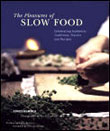Climate Food and Agriculture
All Stories
-
Food for Thought: At Yale Dining Hall, A New Food Ethic Emerges
The word “cafeteria” does not exactly bring to mind healthful, organic, and delicious dining — but Yale University is setting out to change all that. The ivy league institution has teamed up with Alice Waters (the chef who changed the face of American cuisine through Chez Panisse, her California restaurant) to create the Sustainable Food […]
-
Coming Soon: Organic Cheez Whiz
Mainstream food producers are diving into the organic market, which accounts for less than 2 percent of U.S. food sales but has been expanding by more than 20 percent per year. Salivating at this impressive growth rate, many large companies are gobbling up smaller organic producers. In just the latest example, Dean Foods Co., the […]
-
Elizabeth Grossman reviews The Empty Ocean by Richard Ellis
"It's a fire alarm," says Richard Ellis about his new book, The Empty Ocean, which joins a chorus of recent publications documenting the precipitous decline of world fisheries and the dire state of the marine environment. That alarm should make you think long and hard about your lunchtime tuna sandwich or the sashimi you order at your favorite Japanese restaurant.
-
Seasick
Once the fourth largest inland sea in the world, Central Asia’s Aral Sea is drying up rapidly and is likely to all but disappear in as few as 15 years, according to a new study by Moscow’s Shirshov Institute of Oceanology. Since the 1960s, the sea has been depleted by the damming of the main […]
-
Chef’s Salud
Across the Atlantic, another fracas is brewing over genetically modified foods. Yesterday protesters hit the streets in Sacramento, Calif., to rally against GM technology, one day before the start of a large international agricultural conference that is bringing together agriculture ministers from more than 100 countries and reps from biotechnology and agribusiness corporations. Family farmers, […]
-
Ali Macalady reviews Safe Food by Marion Nestle and The Pleasures of Slow Food by Corby Kummer
In 2001, Eric Schlosser published Fast Food Nation -- an expose of America's increasingly consolidated and industrialized food system, and how that system contributes to a whole range of societal ills, from obesity and resistance to antibiotics to urban sprawl, habitat destruction, and poor labor conditions. The book was a smashing success -- 66 weeks and running on the New York Times bestseller list -- and it captured the nation's attention in a way no book about food has since Upton Sinclair's The Jungle, the 1906 classic about the Chicago meatpacking industry.
-
Have a Cow, Man
The state of South Dakota is leading the nation in the Partners for Fish and Wildlife project, a federal conservation program designed to help farmers and ranchers reduce their negative impact on native prairie ecosystems. Conversion of wild grasslands to croplands is a major environmental problem in South Dakota and other prairies states. Under the […]
-
A Bunch of Pinkos
Angry consumers have taken three huge supermarket chains to court for failing to give customers the skinny on the salmon sold at the fish counter. Albertsons, Safeway, and Kroger (which owns QFC and Fred Meyer) are accused of deception, unfair business practices, breach of warranty, and negligent misrepresentation for failing to accurately label farm-raised salmon […]
-
Starting from scratch with chickens and eggs
Chicks and balances. Photo: USDA. It’s very provoking, as Humpty Dumpty once told Alice, to be called an egg. After all, a name must mean something. “My name,” he told her, “means the shape I am — and a good handsome shape it is, too. With a name like yours, you might be any shape, […]

